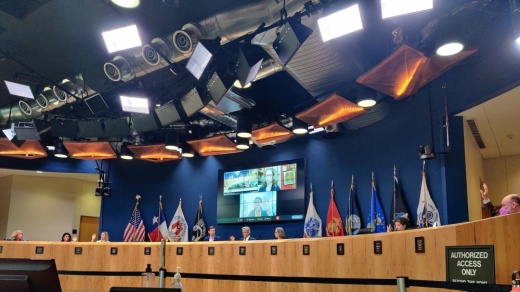The $1.18 million guaranteed income pilot was initially funded in Austin's fiscal year 2021-22 budget approved last August, and a contract for the finalized program first appeared on council's agenda in April. The program's funding, including the monthly payments and administrative costs, comes from the city equity office's budget.
Mayor Steve Adler, who initially sponsored the budget item and has supported the program outline this spring, said it represents a possible way to reduce homelessness in Austin by investing in families at the highest risk of losing their housing.
“We spend so much money trying to get people out of tents and into homes," Adler said following the vote. "It’ll be a lot less expensive if we can find some way to keep people from ending up in the tent in the first place. This is an idea that is showing early success in over 50 different cities, and if it proves to be a cost-effective way to do even better work for people we want to help, then we should look at that."
Last month, council voted to delay consideration of a contract with nonprofit UpTogether to administer the income pilot serving 85 families over the course of one year. Officials said then that more time was needed to review the program outline, how it would be evaluated, which families would be eligible and to clear up misconceptions around the initiative.
Since then, the city equity office released a memo detailing the program's eligibility and performance metrics, and Adler proposed several additional directives tied to the program's launch. Adler's motion sheet included instructions to have the program select families on the edge of being evicted or entering homelessness, and to involve a third-party monitor to determine the pilot's level of success. The instructions also call for city management to appear before council after the program wraps up to report on its results and possible further action.
Adler said his own evaluation of the program will center on keeping families housed.
"If it keeps people out of falling into our streets, then it’s successful. And if it doesn't, then it’s not," he said.
Dozens of city residents—most supportive of the program—took time to comment on the contract approval May 5. Speakers at the council meeting highlighted the success of income programs in other cities and UpTogether's track record with similar initiatives as top reasons to sign off on the pilot. Residents also noted that council had already authorized program funding last year, and pushed back on criticisms of the program as an unregulated handout—although some speakers showed up to oppose the program's launch and said its price tag represented a waste of city funds.
"The city of Austin is not a test tube for conducting social experiments with taxpayer dollars based on personal ideologies," Richard Smith said.
Before their vote, most council members expressed support for the pilot and the additional information provided through the item's recent postponement. Officials echoed Adler's thought that the program represents a piece of Austin's homeless strategy work and that it will help support low-income families. Several also pushed back on some community concerns over the program's cost and oversight.
“This is the kind of program to help people, and you will get it back. It’s not a giveaway," District 3 Council Member Pio Renteria said.
Adler also expressed disappointment at those claims and spoke to his belief that the city should dedicate some funding for work with residents in financial need. He said other initiatives ranging from schools' reduced lunch programs or the federal Child Tax Credit are examples, like the income pilot, of communities providing investments in themselves.
“I am discouraged by hearing the rhetoric about this being a giveaway, and I feel that way whenever I hear people talk about government programs as giveaways. ... I just think that’s so misleading and so wrong," he said.
Mayor Pro Tem Alison Alter represented the lone vote on the dais against the measure. Before the vote, she said she did not believe funding for the program should be approved given the city's ongoing staffing and budget struggles.
District 9 Council Member Kathie Tovo backed the item but also suggested that more consideration be given to the branding of similar city actions in the future. Tovo said presenting the concept as an "investment in families" may have led to a more positive community reception than the guaranteed income label.
The contract passed with tweaks from Tovo and District 6 Council Member Mackenzie Kelly, who was not present for the vote. Kelly's additions will have city management bring back recommendations on program scalability and outside funding in the future. And if the program is found to be successful, any contracts for an extension would go through the city's public solicitation process.
Tovo's additions direct city management to provide interim reports on the pilot and require input from Austin's displacement prevention and innovation offices on the selection of eligible families.
Chief Equity Officer Brion Oaks previously said the pilot could begin one to two months after council approval.





